Analysis of Management Strategies for Enhancing Guest Satisfaction
VerifiedAdded on 2024/06/07
|10
|2419
|235
Report
AI Summary
This report analyzes the challenges faced by the Imperial Hotel, a 500-bed, 4-star hotel in London, which has experienced a decline in guest satisfaction due to issues such as cleanliness, maintenance, and staff behavior. It explores various management theories, including scientific management, bureaucratic theory, human relations theory, system theory, X&Y theory, and administrative theory, to identify potential solutions. The report highlights problems such as poor reception service, billing errors, and lack of coordination between departments. Key proposals include cross-team building exercises, review of team bonus schemes, IT systems training, and motivational training programs aimed at improving employee motivation, teamwork, and overall service quality. The ultimate goal is to align staff with the hotel's business goals, foster a high-performance work culture, and enhance customer satisfaction to regain its prestigious position in the hospitality industry.
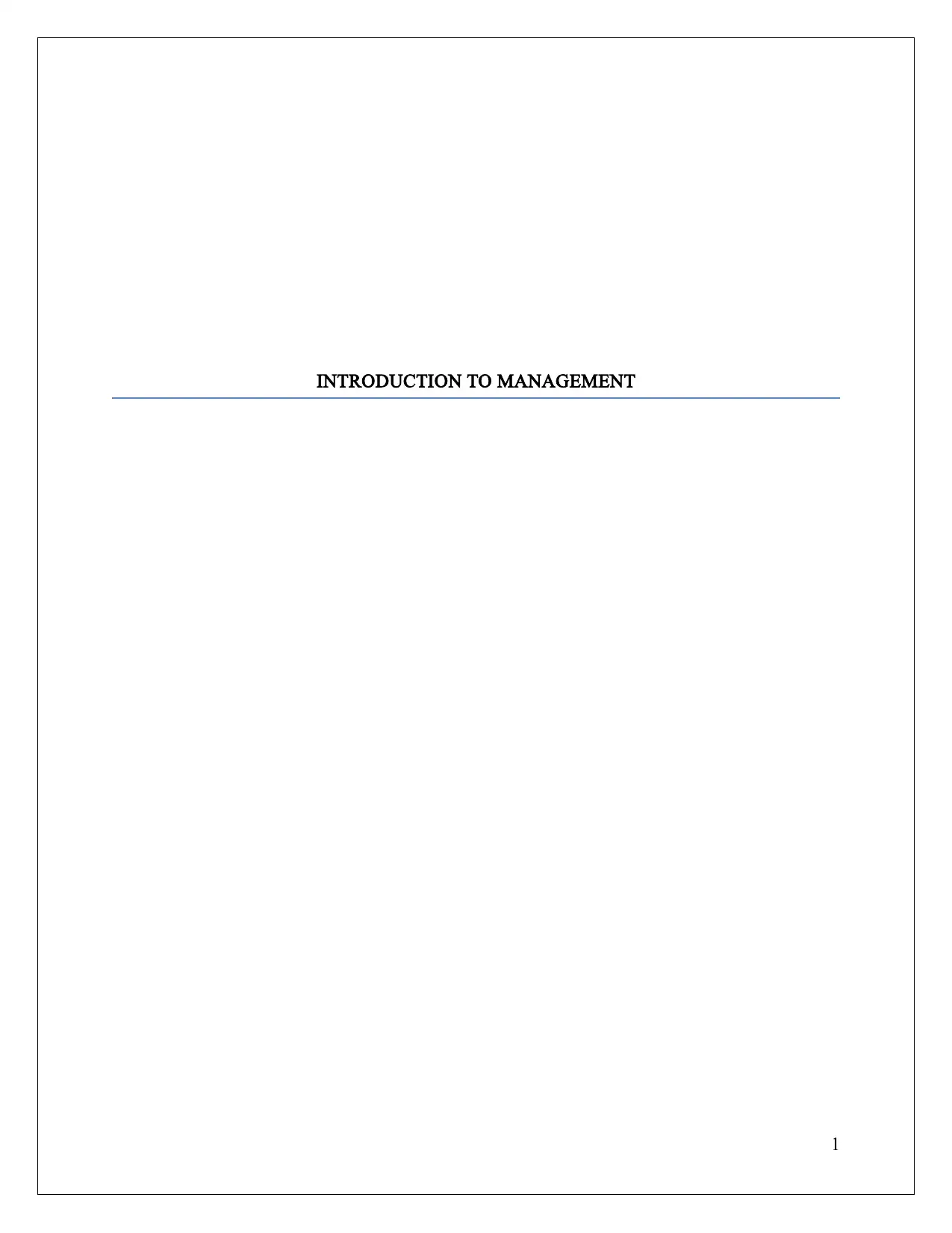
INTRODUCTION TO MANAGEMENT
1
1
Paraphrase This Document
Need a fresh take? Get an instant paraphrase of this document with our AI Paraphraser
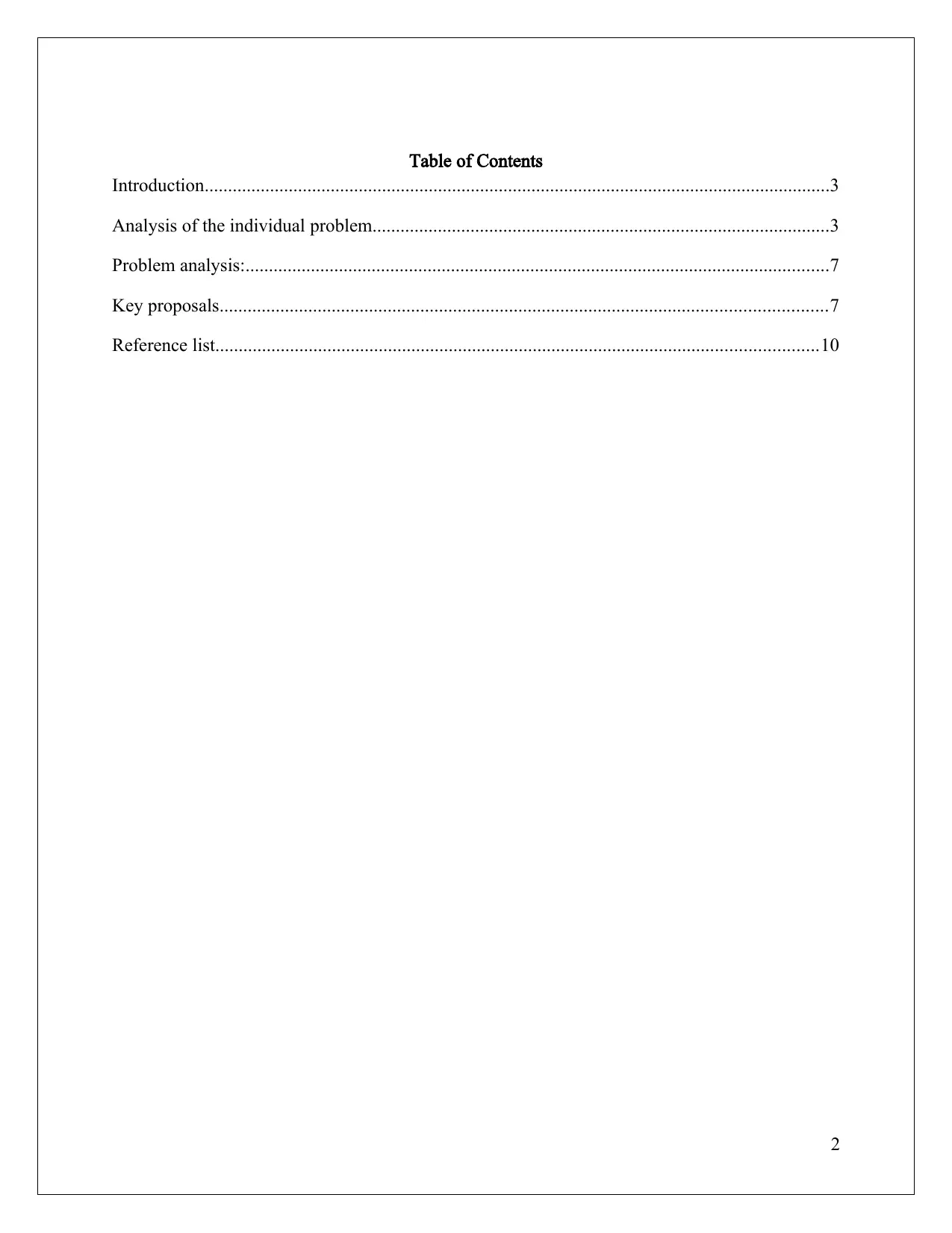
Table of Contents
Introduction......................................................................................................................................3
Analysis of the individual problem..................................................................................................3
Problem analysis:.............................................................................................................................7
Key proposals..................................................................................................................................7
Reference list.................................................................................................................................10
2
Introduction......................................................................................................................................3
Analysis of the individual problem..................................................................................................3
Problem analysis:.............................................................................................................................7
Key proposals..................................................................................................................................7
Reference list.................................................................................................................................10
2
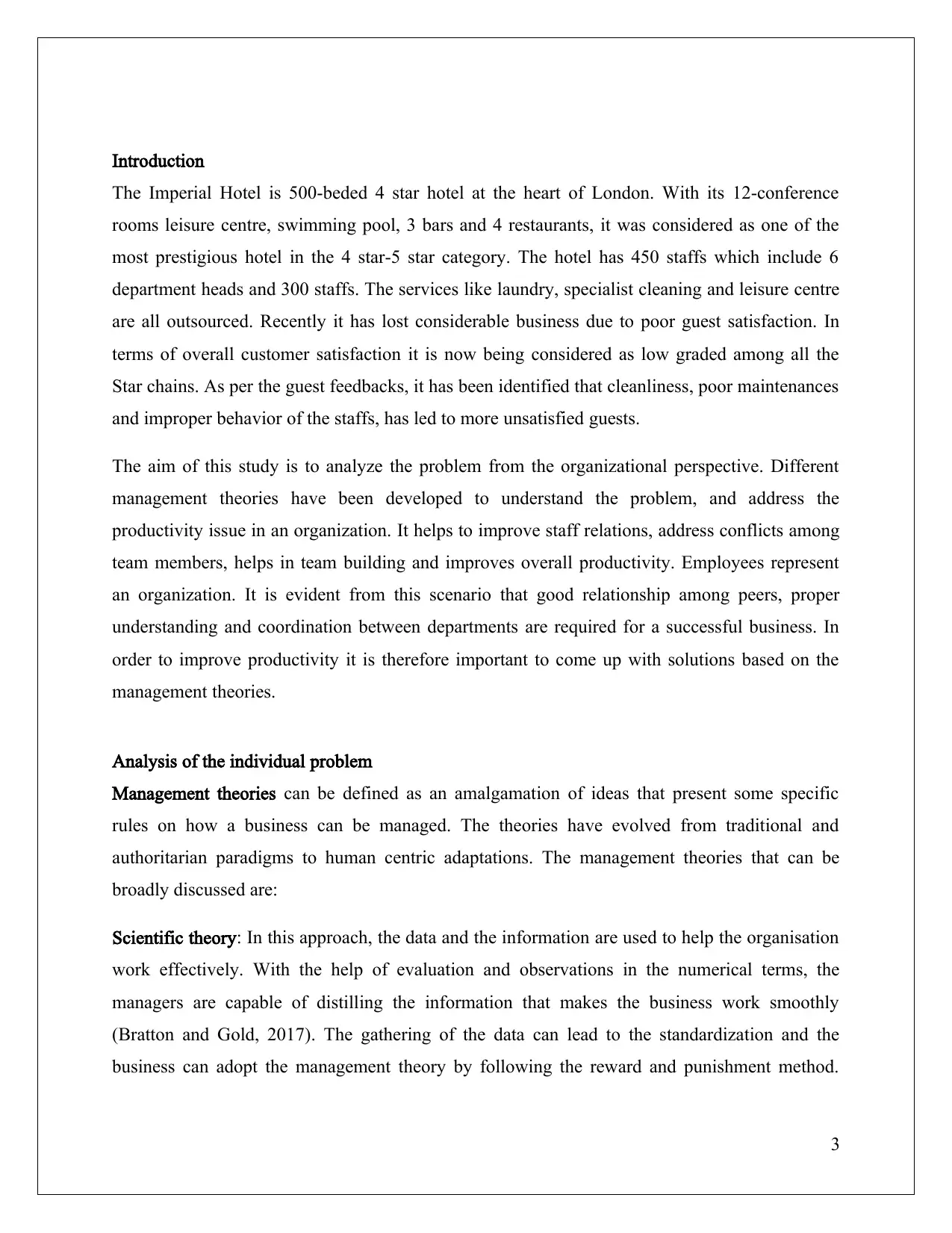
Introduction
The Imperial Hotel is 500-beded 4 star hotel at the heart of London. With its 12-conference
rooms leisure centre, swimming pool, 3 bars and 4 restaurants, it was considered as one of the
most prestigious hotel in the 4 star-5 star category. The hotel has 450 staffs which include 6
department heads and 300 staffs. The services like laundry, specialist cleaning and leisure centre
are all outsourced. Recently it has lost considerable business due to poor guest satisfaction. In
terms of overall customer satisfaction it is now being considered as low graded among all the
Star chains. As per the guest feedbacks, it has been identified that cleanliness, poor maintenances
and improper behavior of the staffs, has led to more unsatisfied guests.
The aim of this study is to analyze the problem from the organizational perspective. Different
management theories have been developed to understand the problem, and address the
productivity issue in an organization. It helps to improve staff relations, address conflicts among
team members, helps in team building and improves overall productivity. Employees represent
an organization. It is evident from this scenario that good relationship among peers, proper
understanding and coordination between departments are required for a successful business. In
order to improve productivity it is therefore important to come up with solutions based on the
management theories.
Analysis of the individual problem
Management theories can be defined as an amalgamation of ideas that present some specific
rules on how a business can be managed. The theories have evolved from traditional and
authoritarian paradigms to human centric adaptations. The management theories that can be
broadly discussed are:
Scientific theory: In this approach, the data and the information are used to help the organisation
work effectively. With the help of evaluation and observations in the numerical terms, the
managers are capable of distilling the information that makes the business work smoothly
(Bratton and Gold, 2017). The gathering of the data can lead to the standardization and the
business can adopt the management theory by following the reward and punishment method.
3
The Imperial Hotel is 500-beded 4 star hotel at the heart of London. With its 12-conference
rooms leisure centre, swimming pool, 3 bars and 4 restaurants, it was considered as one of the
most prestigious hotel in the 4 star-5 star category. The hotel has 450 staffs which include 6
department heads and 300 staffs. The services like laundry, specialist cleaning and leisure centre
are all outsourced. Recently it has lost considerable business due to poor guest satisfaction. In
terms of overall customer satisfaction it is now being considered as low graded among all the
Star chains. As per the guest feedbacks, it has been identified that cleanliness, poor maintenances
and improper behavior of the staffs, has led to more unsatisfied guests.
The aim of this study is to analyze the problem from the organizational perspective. Different
management theories have been developed to understand the problem, and address the
productivity issue in an organization. It helps to improve staff relations, address conflicts among
team members, helps in team building and improves overall productivity. Employees represent
an organization. It is evident from this scenario that good relationship among peers, proper
understanding and coordination between departments are required for a successful business. In
order to improve productivity it is therefore important to come up with solutions based on the
management theories.
Analysis of the individual problem
Management theories can be defined as an amalgamation of ideas that present some specific
rules on how a business can be managed. The theories have evolved from traditional and
authoritarian paradigms to human centric adaptations. The management theories that can be
broadly discussed are:
Scientific theory: In this approach, the data and the information are used to help the organisation
work effectively. With the help of evaluation and observations in the numerical terms, the
managers are capable of distilling the information that makes the business work smoothly
(Bratton and Gold, 2017). The gathering of the data can lead to the standardization and the
business can adopt the management theory by following the reward and punishment method.
3
⊘ This is a preview!⊘
Do you want full access?
Subscribe today to unlock all pages.

Trusted by 1+ million students worldwide
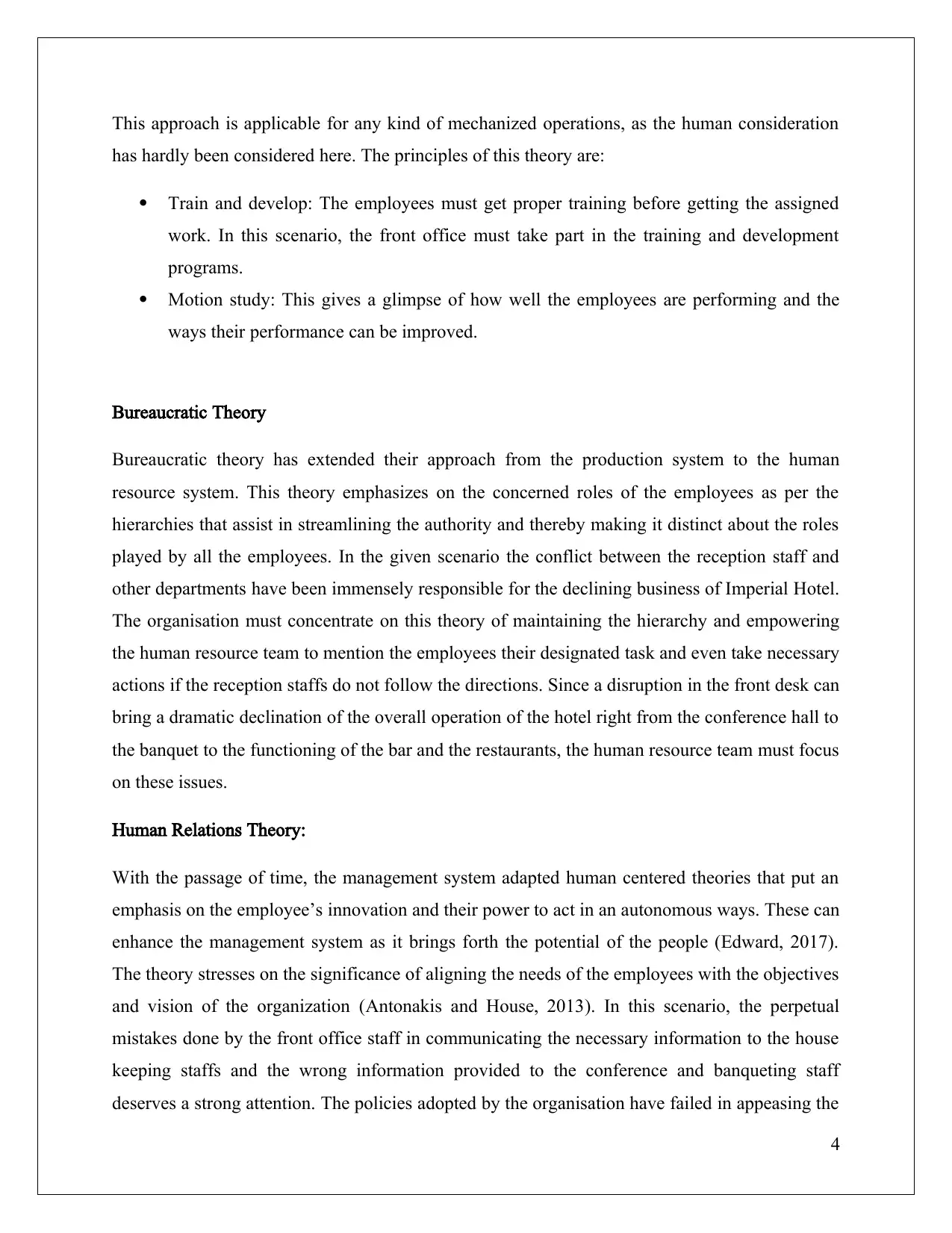
This approach is applicable for any kind of mechanized operations, as the human consideration
has hardly been considered here. The principles of this theory are:
Train and develop: The employees must get proper training before getting the assigned
work. In this scenario, the front office must take part in the training and development
programs.
Motion study: This gives a glimpse of how well the employees are performing and the
ways their performance can be improved.
Bureaucratic Theory
Bureaucratic theory has extended their approach from the production system to the human
resource system. This theory emphasizes on the concerned roles of the employees as per the
hierarchies that assist in streamlining the authority and thereby making it distinct about the roles
played by all the employees. In the given scenario the conflict between the reception staff and
other departments have been immensely responsible for the declining business of Imperial Hotel.
The organisation must concentrate on this theory of maintaining the hierarchy and empowering
the human resource team to mention the employees their designated task and even take necessary
actions if the reception staffs do not follow the directions. Since a disruption in the front desk can
bring a dramatic declination of the overall operation of the hotel right from the conference hall to
the banquet to the functioning of the bar and the restaurants, the human resource team must focus
on these issues.
Human Relations Theory:
With the passage of time, the management system adapted human centered theories that put an
emphasis on the employee’s innovation and their power to act in an autonomous ways. These can
enhance the management system as it brings forth the potential of the people (Edward, 2017).
The theory stresses on the significance of aligning the needs of the employees with the objectives
and vision of the organization (Antonakis and House, 2013). In this scenario, the perpetual
mistakes done by the front office staff in communicating the necessary information to the house
keeping staffs and the wrong information provided to the conference and banqueting staff
deserves a strong attention. The policies adopted by the organisation have failed in appeasing the
4
has hardly been considered here. The principles of this theory are:
Train and develop: The employees must get proper training before getting the assigned
work. In this scenario, the front office must take part in the training and development
programs.
Motion study: This gives a glimpse of how well the employees are performing and the
ways their performance can be improved.
Bureaucratic Theory
Bureaucratic theory has extended their approach from the production system to the human
resource system. This theory emphasizes on the concerned roles of the employees as per the
hierarchies that assist in streamlining the authority and thereby making it distinct about the roles
played by all the employees. In the given scenario the conflict between the reception staff and
other departments have been immensely responsible for the declining business of Imperial Hotel.
The organisation must concentrate on this theory of maintaining the hierarchy and empowering
the human resource team to mention the employees their designated task and even take necessary
actions if the reception staffs do not follow the directions. Since a disruption in the front desk can
bring a dramatic declination of the overall operation of the hotel right from the conference hall to
the banquet to the functioning of the bar and the restaurants, the human resource team must focus
on these issues.
Human Relations Theory:
With the passage of time, the management system adapted human centered theories that put an
emphasis on the employee’s innovation and their power to act in an autonomous ways. These can
enhance the management system as it brings forth the potential of the people (Edward, 2017).
The theory stresses on the significance of aligning the needs of the employees with the objectives
and vision of the organization (Antonakis and House, 2013). In this scenario, the perpetual
mistakes done by the front office staff in communicating the necessary information to the house
keeping staffs and the wrong information provided to the conference and banqueting staff
deserves a strong attention. The policies adopted by the organisation have failed in appeasing the
4
Paraphrase This Document
Need a fresh take? Get an instant paraphrase of this document with our AI Paraphraser
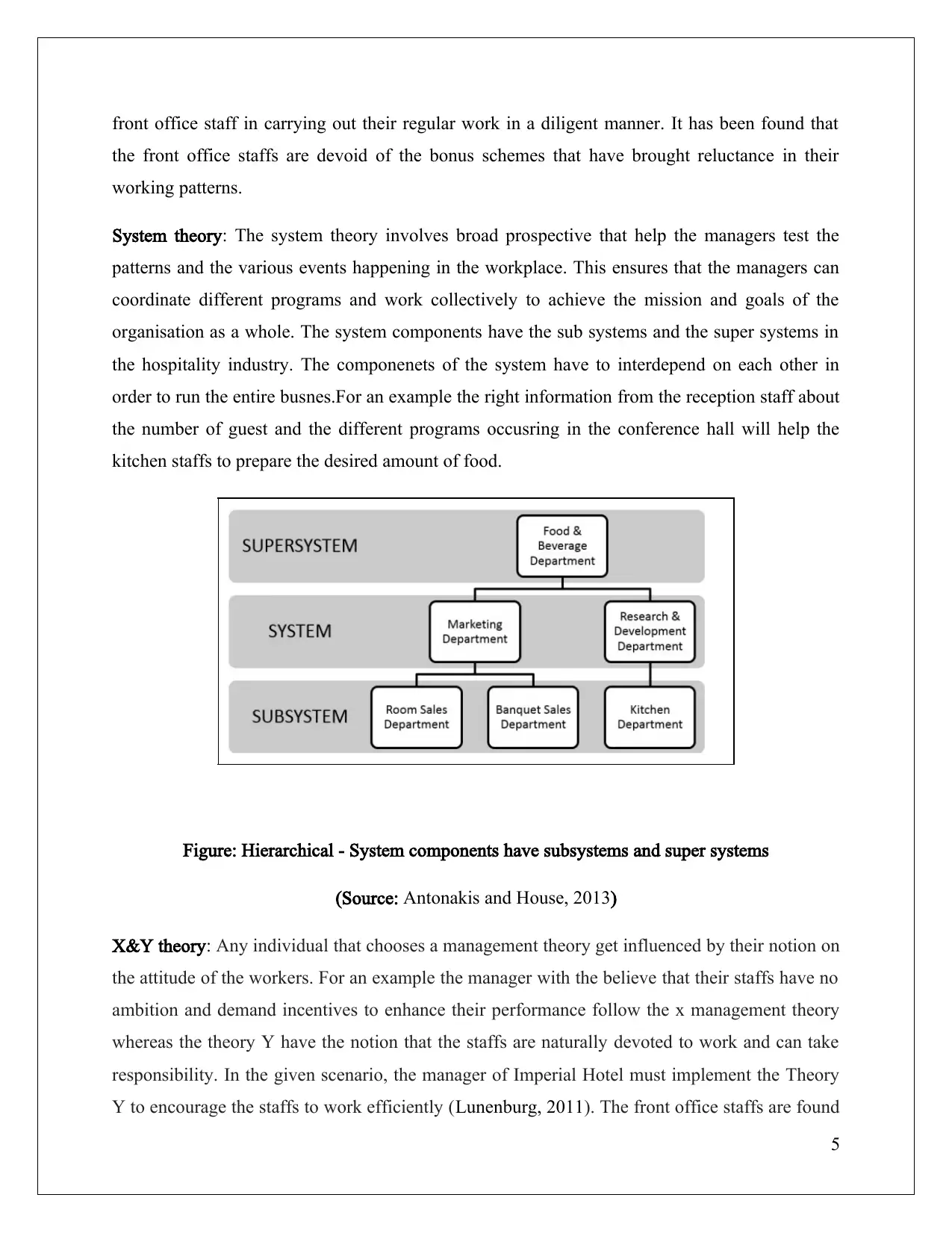
front office staff in carrying out their regular work in a diligent manner. It has been found that
the front office staffs are devoid of the bonus schemes that have brought reluctance in their
working patterns.
System theory: The system theory involves broad prospective that help the managers test the
patterns and the various events happening in the workplace. This ensures that the managers can
coordinate different programs and work collectively to achieve the mission and goals of the
organisation as a whole. The system components have the sub systems and the super systems in
the hospitality industry. The componenets of the system have to interdepend on each other in
order to run the entire busnes.For an example the right information from the reception staff about
the number of guest and the different programs occusring in the conference hall will help the
kitchen staffs to prepare the desired amount of food.
Figure: Hierarchical - System components have subsystems and super systems
(Source: Antonakis and House, 2013)
X&Y theory: Any individual that chooses a management theory get influenced by their notion on
the attitude of the workers. For an example the manager with the believe that their staffs have no
ambition and demand incentives to enhance their performance follow the x management theory
whereas the theory Y have the notion that the staffs are naturally devoted to work and can take
responsibility. In the given scenario, the manager of Imperial Hotel must implement the Theory
Y to encourage the staffs to work efficiently (Lunenburg, 2011). The front office staffs are found
5
the front office staffs are devoid of the bonus schemes that have brought reluctance in their
working patterns.
System theory: The system theory involves broad prospective that help the managers test the
patterns and the various events happening in the workplace. This ensures that the managers can
coordinate different programs and work collectively to achieve the mission and goals of the
organisation as a whole. The system components have the sub systems and the super systems in
the hospitality industry. The componenets of the system have to interdepend on each other in
order to run the entire busnes.For an example the right information from the reception staff about
the number of guest and the different programs occusring in the conference hall will help the
kitchen staffs to prepare the desired amount of food.
Figure: Hierarchical - System components have subsystems and super systems
(Source: Antonakis and House, 2013)
X&Y theory: Any individual that chooses a management theory get influenced by their notion on
the attitude of the workers. For an example the manager with the believe that their staffs have no
ambition and demand incentives to enhance their performance follow the x management theory
whereas the theory Y have the notion that the staffs are naturally devoted to work and can take
responsibility. In the given scenario, the manager of Imperial Hotel must implement the Theory
Y to encourage the staffs to work efficiently (Lunenburg, 2011). The front office staffs are found
5
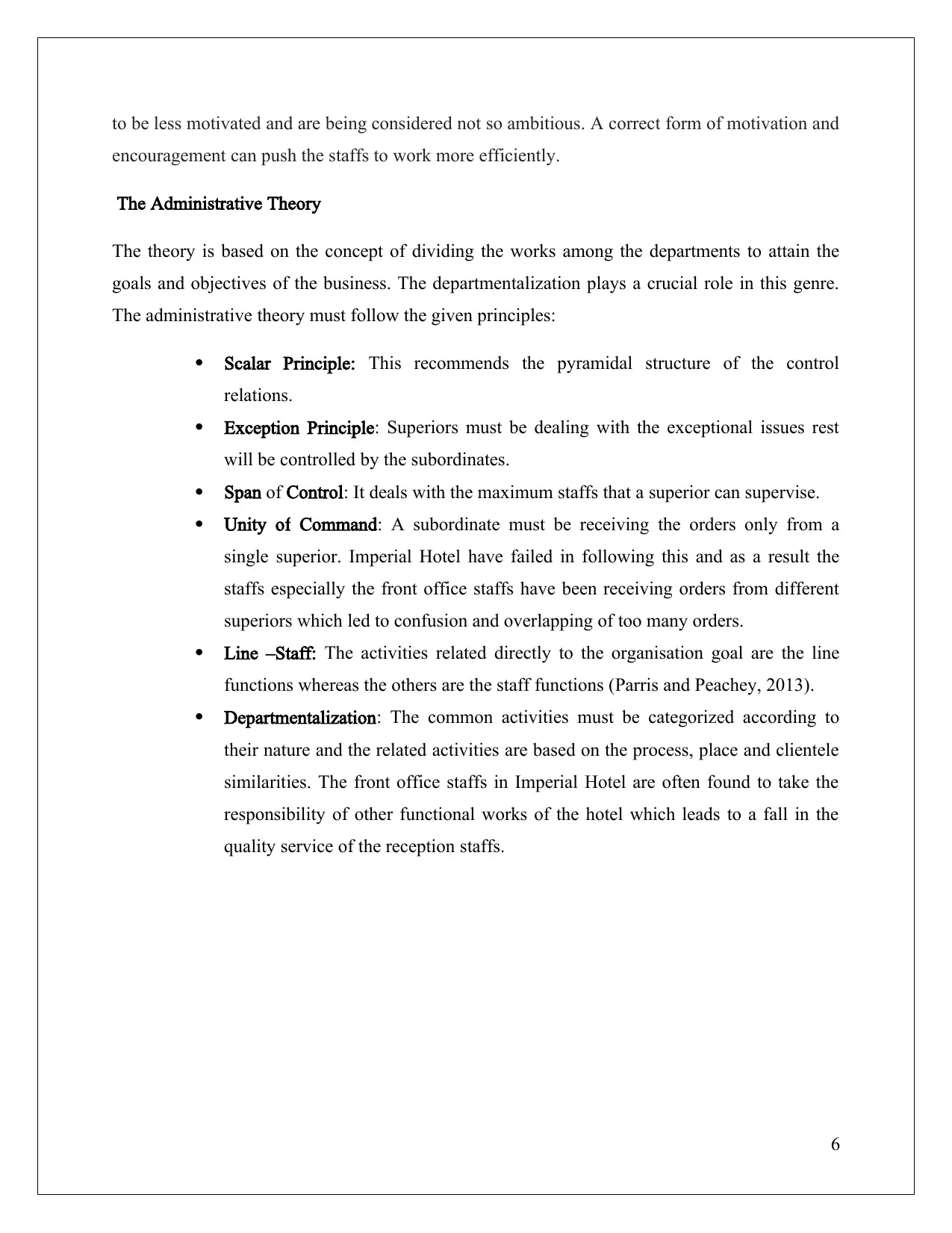
to be less motivated and are being considered not so ambitious. A correct form of motivation and
encouragement can push the staffs to work more efficiently.
The Administrative Theory
The theory is based on the concept of dividing the works among the departments to attain the
goals and objectives of the business. The departmentalization plays a crucial role in this genre.
The administrative theory must follow the given principles:
Scalar Principle: This recommends the pyramidal structure of the control
relations.
Exception Principle: Superiors must be dealing with the exceptional issues rest
will be controlled by the subordinates.
Span of Control: It deals with the maximum staffs that a superior can supervise.
Unity of Command: A subordinate must be receiving the orders only from a
single superior. Imperial Hotel have failed in following this and as a result the
staffs especially the front office staffs have been receiving orders from different
superiors which led to confusion and overlapping of too many orders.
Line –Staff: The activities related directly to the organisation goal are the line
functions whereas the others are the staff functions (Parris and Peachey, 2013).
Departmentalization: The common activities must be categorized according to
their nature and the related activities are based on the process, place and clientele
similarities. The front office staffs in Imperial Hotel are often found to take the
responsibility of other functional works of the hotel which leads to a fall in the
quality service of the reception staffs.
6
encouragement can push the staffs to work more efficiently.
The Administrative Theory
The theory is based on the concept of dividing the works among the departments to attain the
goals and objectives of the business. The departmentalization plays a crucial role in this genre.
The administrative theory must follow the given principles:
Scalar Principle: This recommends the pyramidal structure of the control
relations.
Exception Principle: Superiors must be dealing with the exceptional issues rest
will be controlled by the subordinates.
Span of Control: It deals with the maximum staffs that a superior can supervise.
Unity of Command: A subordinate must be receiving the orders only from a
single superior. Imperial Hotel have failed in following this and as a result the
staffs especially the front office staffs have been receiving orders from different
superiors which led to confusion and overlapping of too many orders.
Line –Staff: The activities related directly to the organisation goal are the line
functions whereas the others are the staff functions (Parris and Peachey, 2013).
Departmentalization: The common activities must be categorized according to
their nature and the related activities are based on the process, place and clientele
similarities. The front office staffs in Imperial Hotel are often found to take the
responsibility of other functional works of the hotel which leads to a fall in the
quality service of the reception staffs.
6
⊘ This is a preview!⊘
Do you want full access?
Subscribe today to unlock all pages.

Trusted by 1+ million students worldwide
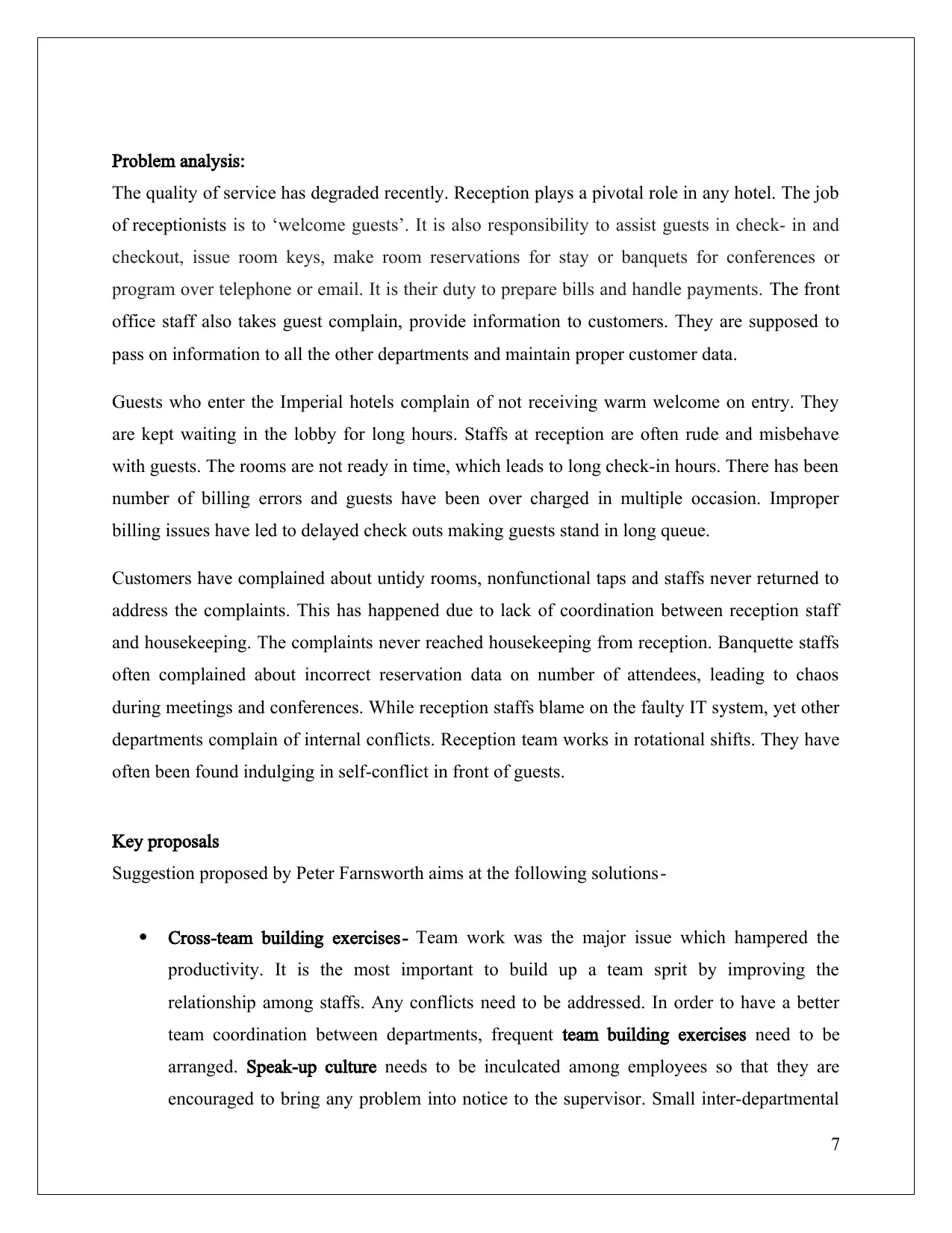
Problem analysis:
The quality of service has degraded recently. Reception plays a pivotal role in any hotel. The job
of receptionists is to ‘welcome guests’. It is also responsibility to assist guests in check- in and
checkout, issue room keys, make room reservations for stay or banquets for conferences or
program over telephone or email. It is their duty to prepare bills and handle payments. The front
office staff also takes guest complain, provide information to customers. They are supposed to
pass on information to all the other departments and maintain proper customer data.
Guests who enter the Imperial hotels complain of not receiving warm welcome on entry. They
are kept waiting in the lobby for long hours. Staffs at reception are often rude and misbehave
with guests. The rooms are not ready in time, which leads to long check-in hours. There has been
number of billing errors and guests have been over charged in multiple occasion. Improper
billing issues have led to delayed check outs making guests stand in long queue.
Customers have complained about untidy rooms, nonfunctional taps and staffs never returned to
address the complaints. This has happened due to lack of coordination between reception staff
and housekeeping. The complaints never reached housekeeping from reception. Banquette staffs
often complained about incorrect reservation data on number of attendees, leading to chaos
during meetings and conferences. While reception staffs blame on the faulty IT system, yet other
departments complain of internal conflicts. Reception team works in rotational shifts. They have
often been found indulging in self-conflict in front of guests.
Key proposals
Suggestion proposed by Peter Farnsworth aims at the following solutions
-
Cross-team building exercises
- Team work was the major issue which hampered the
productivity. It is the most important to build up a team sprit by improving the
relationship among staffs. Any conflicts need to be addressed. In order to have a better
team coordination between departments, frequent team building exercises need to be
arranged. Speak-up culture needs to be inculcated among employees so that they are
encouraged to bring any problem into notice to the supervisor. Small inter-departmental
7
The quality of service has degraded recently. Reception plays a pivotal role in any hotel. The job
of receptionists is to ‘welcome guests’. It is also responsibility to assist guests in check- in and
checkout, issue room keys, make room reservations for stay or banquets for conferences or
program over telephone or email. It is their duty to prepare bills and handle payments. The front
office staff also takes guest complain, provide information to customers. They are supposed to
pass on information to all the other departments and maintain proper customer data.
Guests who enter the Imperial hotels complain of not receiving warm welcome on entry. They
are kept waiting in the lobby for long hours. Staffs at reception are often rude and misbehave
with guests. The rooms are not ready in time, which leads to long check-in hours. There has been
number of billing errors and guests have been over charged in multiple occasion. Improper
billing issues have led to delayed check outs making guests stand in long queue.
Customers have complained about untidy rooms, nonfunctional taps and staffs never returned to
address the complaints. This has happened due to lack of coordination between reception staff
and housekeeping. The complaints never reached housekeeping from reception. Banquette staffs
often complained about incorrect reservation data on number of attendees, leading to chaos
during meetings and conferences. While reception staffs blame on the faulty IT system, yet other
departments complain of internal conflicts. Reception team works in rotational shifts. They have
often been found indulging in self-conflict in front of guests.
Key proposals
Suggestion proposed by Peter Farnsworth aims at the following solutions
-
Cross-team building exercises
- Team work was the major issue which hampered the
productivity. It is the most important to build up a team sprit by improving the
relationship among staffs. Any conflicts need to be addressed. In order to have a better
team coordination between departments, frequent team building exercises need to be
arranged. Speak-up culture needs to be inculcated among employees so that they are
encouraged to bring any problem into notice to the supervisor. Small inter-departmental
7
Paraphrase This Document
Need a fresh take? Get an instant paraphrase of this document with our AI Paraphraser
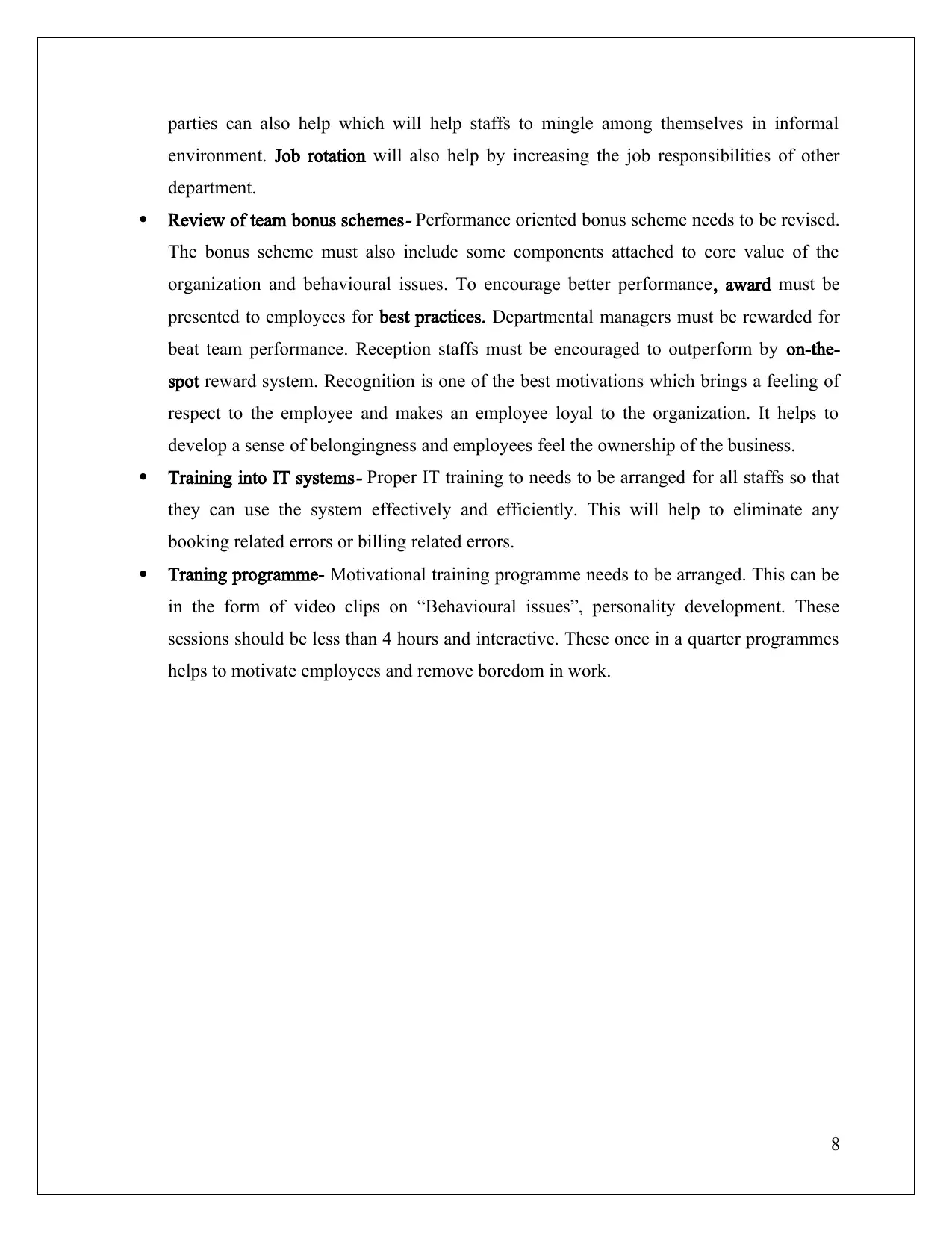
parties can also help which will help staffs to mingle among themselves in informal
environment. Job rotation will also help by increasing the job responsibilities of other
department.
Review of team bonus schemes
- Performance oriented bonus scheme needs to be revised.
The bonus scheme must also include some components attached to core value of the
organization and behavioural issues. To encourage better performance, award must be
presented to employees for best practices. Departmental managers must be rewarded for
beat team performance. Reception staffs must be encouraged to outperform by on-the-
spot reward system. Recognition is one of the best motivations which brings a feeling of
respect to the employee and makes an employee loyal to the organization. It helps to
develop a sense of belongingness and employees feel the ownership of the business.
Training into IT systems
- Proper IT training to needs to be arranged for all staffs so that
they can use the system effectively and efficiently. This will help to eliminate any
booking related errors or billing related errors.
Traning programme- Motivational training programme needs to be arranged. This can be
in the form of video clips on “Behavioural issues”, personality development. These
sessions should be less than 4 hours and interactive. These once in a quarter programmes
helps to motivate employees and remove boredom in work.
8
environment. Job rotation will also help by increasing the job responsibilities of other
department.
Review of team bonus schemes
- Performance oriented bonus scheme needs to be revised.
The bonus scheme must also include some components attached to core value of the
organization and behavioural issues. To encourage better performance, award must be
presented to employees for best practices. Departmental managers must be rewarded for
beat team performance. Reception staffs must be encouraged to outperform by on-the-
spot reward system. Recognition is one of the best motivations which brings a feeling of
respect to the employee and makes an employee loyal to the organization. It helps to
develop a sense of belongingness and employees feel the ownership of the business.
Training into IT systems
- Proper IT training to needs to be arranged for all staffs so that
they can use the system effectively and efficiently. This will help to eliminate any
booking related errors or billing related errors.
Traning programme- Motivational training programme needs to be arranged. This can be
in the form of video clips on “Behavioural issues”, personality development. These
sessions should be less than 4 hours and interactive. These once in a quarter programmes
helps to motivate employees and remove boredom in work.
8
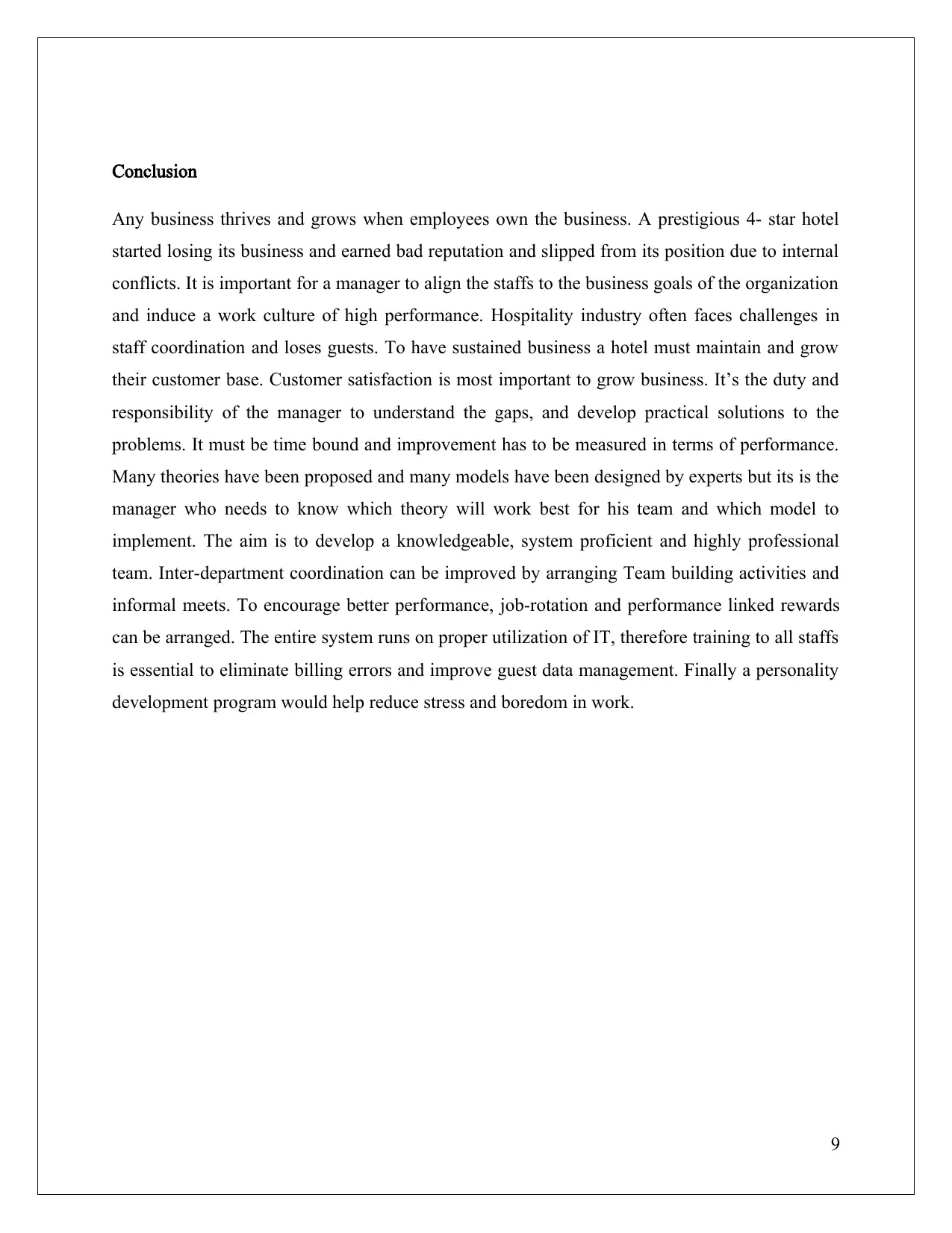
Conclusion
Any business thrives and grows when employees own the business. A prestigious 4- star hotel
started losing its business and earned bad reputation and slipped from its position due to internal
conflicts. It is important for a manager to align the staffs to the business goals of the organization
and induce a work culture of high performance. Hospitality industry often faces challenges in
staff coordination and loses guests. To have sustained business a hotel must maintain and grow
their customer base. Customer satisfaction is most important to grow business. It’s the duty and
responsibility of the manager to understand the gaps, and develop practical solutions to the
problems. It must be time bound and improvement has to be measured in terms of performance.
Many theories have been proposed and many models have been designed by experts but its is the
manager who needs to know which theory will work best for his team and which model to
implement. The aim is to develop a knowledgeable, system proficient and highly professional
team. Inter-department coordination can be improved by arranging Team building activities and
informal meets. To encourage better performance, job-rotation and performance linked rewards
can be arranged. The entire system runs on proper utilization of IT, therefore training to all staffs
is essential to eliminate billing errors and improve guest data management. Finally a personality
development program would help reduce stress and boredom in work.
9
Any business thrives and grows when employees own the business. A prestigious 4- star hotel
started losing its business and earned bad reputation and slipped from its position due to internal
conflicts. It is important for a manager to align the staffs to the business goals of the organization
and induce a work culture of high performance. Hospitality industry often faces challenges in
staff coordination and loses guests. To have sustained business a hotel must maintain and grow
their customer base. Customer satisfaction is most important to grow business. It’s the duty and
responsibility of the manager to understand the gaps, and develop practical solutions to the
problems. It must be time bound and improvement has to be measured in terms of performance.
Many theories have been proposed and many models have been designed by experts but its is the
manager who needs to know which theory will work best for his team and which model to
implement. The aim is to develop a knowledgeable, system proficient and highly professional
team. Inter-department coordination can be improved by arranging Team building activities and
informal meets. To encourage better performance, job-rotation and performance linked rewards
can be arranged. The entire system runs on proper utilization of IT, therefore training to all staffs
is essential to eliminate billing errors and improve guest data management. Finally a personality
development program would help reduce stress and boredom in work.
9
⊘ This is a preview!⊘
Do you want full access?
Subscribe today to unlock all pages.

Trusted by 1+ million students worldwide
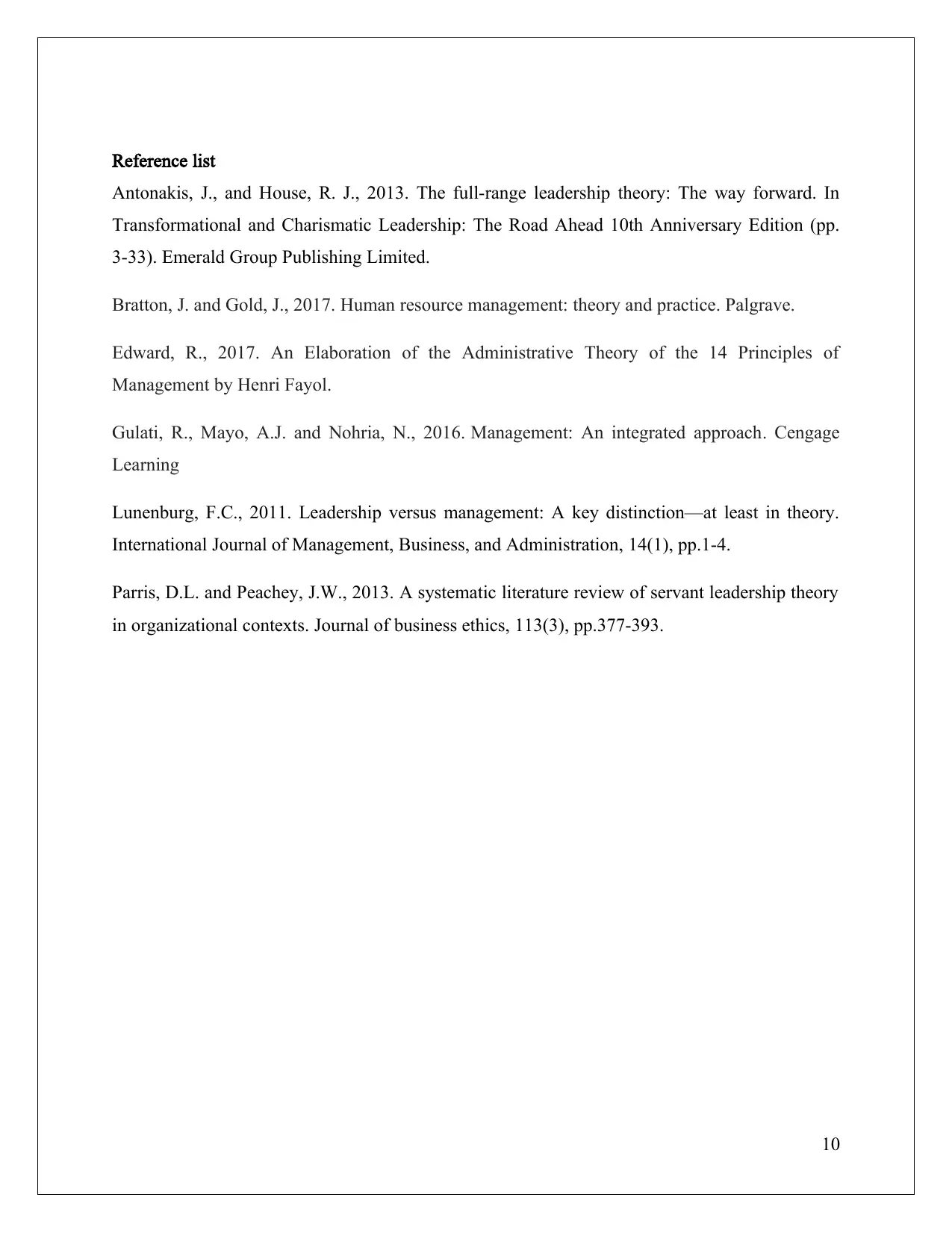
Reference list
Antonakis, J., and House, R. J., 2013. The full-range leadership theory: The way forward. In
Transformational and Charismatic Leadership: The Road Ahead 10th Anniversary Edition (pp.
3-33). Emerald Group Publishing Limited.
Bratton, J. and Gold, J., 2017. Human resource management: theory and practice. Palgrave.
Edward, R., 2017. An Elaboration of the Administrative Theory of the 14 Principles of
Management by Henri Fayol.
Gulati, R., Mayo, A.J. and Nohria, N., 2016. Management: An integrated approach. Cengage
Learning
Lunenburg, F.C., 2011. Leadership versus management: A key distinction—at least in theory.
International Journal of Management, Business, and Administration, 14(1), pp.1-4.
Parris, D.L. and Peachey, J.W., 2013. A systematic literature review of servant leadership theory
in organizational contexts. Journal of business ethics, 113(3), pp.377-393.
10
Antonakis, J., and House, R. J., 2013. The full-range leadership theory: The way forward. In
Transformational and Charismatic Leadership: The Road Ahead 10th Anniversary Edition (pp.
3-33). Emerald Group Publishing Limited.
Bratton, J. and Gold, J., 2017. Human resource management: theory and practice. Palgrave.
Edward, R., 2017. An Elaboration of the Administrative Theory of the 14 Principles of
Management by Henri Fayol.
Gulati, R., Mayo, A.J. and Nohria, N., 2016. Management: An integrated approach. Cengage
Learning
Lunenburg, F.C., 2011. Leadership versus management: A key distinction—at least in theory.
International Journal of Management, Business, and Administration, 14(1), pp.1-4.
Parris, D.L. and Peachey, J.W., 2013. A systematic literature review of servant leadership theory
in organizational contexts. Journal of business ethics, 113(3), pp.377-393.
10
1 out of 10
Related Documents
Your All-in-One AI-Powered Toolkit for Academic Success.
+13062052269
info@desklib.com
Available 24*7 on WhatsApp / Email
![[object Object]](/_next/static/media/star-bottom.7253800d.svg)
Unlock your academic potential
Copyright © 2020–2025 A2Z Services. All Rights Reserved. Developed and managed by ZUCOL.




